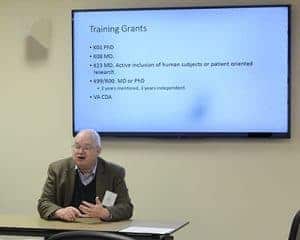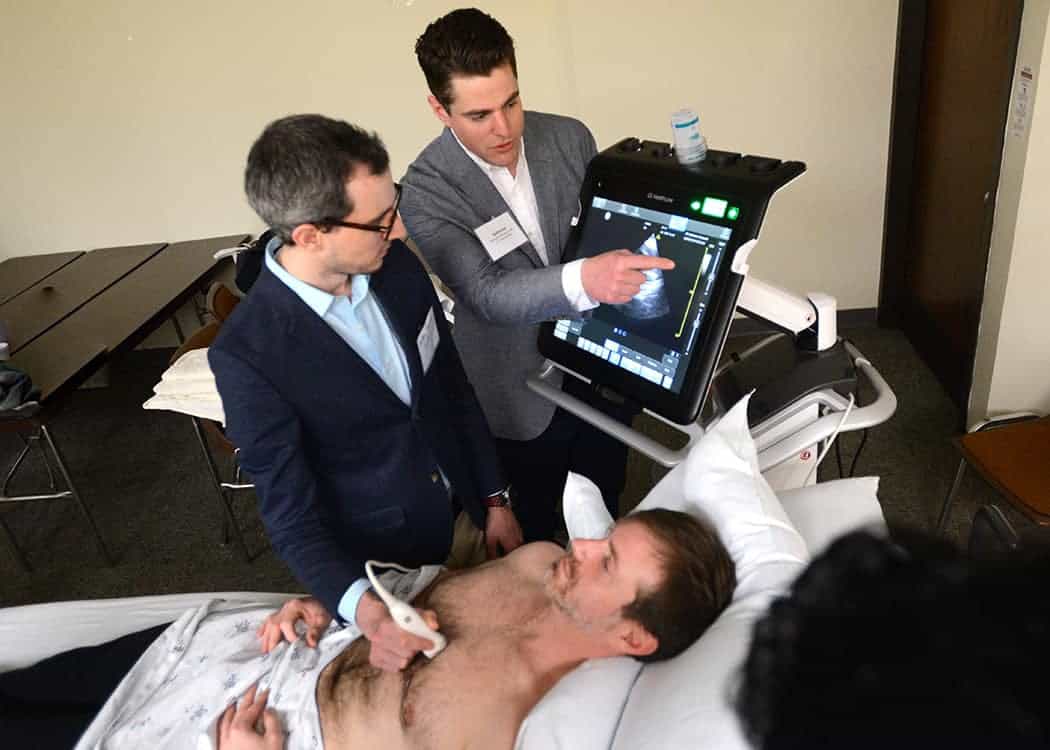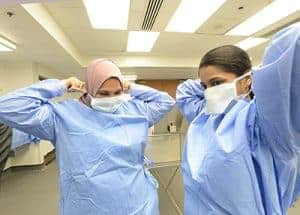KidneyCon 2018 Spotlights Advances, Careers in Nephrology
| class="MsoNormal">April 23, 2018 | ‘Learn one, do one and teach one’ has been a longstanding idea in medical education, and attendees at the third annual UAMS KidneyCon held April 6-8 each got chances at one or more of those experiences.
About 100 nephrologists, nephrology fellows and internal medicine residents from 26 states attended the conference sponsored by the UAMS College of Medicine’s Division of Nephrology. The event held sessions at the Clinton Presidential Center, the Marriott Hotel in downtown Little Rock, and the UAMS Education II building.

John Arthur, M.D., Ph.D., explains different federal research grant programs. Arthur also is director of the Division of Nephrology in the College of Medicine’s Department of Internal Medicine.
The conference provided updates on the latest advances in kidney care in a hands-on collaborative format and helped build enthusiasm for the field of nephrology among residents and fellows. KidneyCon had an active social media impact with 1,770 tweets and 4.2 million impressions during the week of the conference.
Workshops with standardized patients were used to simulate realistic practice conditions. Attendees used simulation technology and cadavers to practice renal biopsies and perform ultrasounds.
John Arthur, M.D., Ph.D., director of the Division of Nephrology in the College of Medicine’s Department of Internal Medicine, led an informal panel discussion for several beginning residents and fellows titled, “House Staff to Physician: How Do I Get There from Here?”
“This is my philosophy about how to tie grants into your career,” Arthur said. “It’s not easy to do research as a resident, but it’s important. If you can show you were able to do that, they will be impressed. Identify a mentor, work with that mentor and then think about how things fit together. People who want that role as mentor want to be sure their knowledge is passed on.”
Also on the panel was Matthew Sparks, M.D., assistant professor of medicine in the Department of Nephrology at Duke University in Durham, North Carolina, and Brent Wagner, M.D., Kidney Institute of New Mexico in Albuquerque.
In his presentation, Arthur explained the differences between National Institutes of Health training grant and research grant programs. Panelists and attendees discussed mentoring, how to use social media, academic advancement and choosing the right research project.
Other sessions covered topics such as dialysis, communication skills, vascular ultrasound, kidney pathology, interventional nephrology, nephrology education, acute kidney injury and liver disease, and kidney and calcium stones and urological interventions.
“KidneyCon was a fantastic opportunity for residents and fellows to engage in current topics in nephrology and seek out mentors,” said Nhi Tan, M.D., chief medical resident at Kaiser Oakland Medical Center in Oakland, California. “The conference ran smoothly, and the workshops were dynamic. I am only sorry that I could only attend two workshops.”
“I think to gain interest in nephrology you need conferences such as KidneyCon,” said Kenar Jhaveri, M.D., assistant professor of medicine at Zucker School of Medicine at Hofstra/Northwell. “They really make this a unique, small group experience where you can interact with faculty one on one, which can really spark interest in the field. When you have small group experiences, it means trainees get a chance to meet the top notch nephrology educators face to face.”

